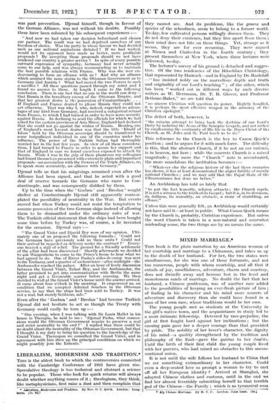MIXED MARRIAGE.* THIS book is the plain narration by an
American woman of her courtship and marriage to a Chinaman, and takes us up to the death of her husband. For her, the two states were simultaneous, for she was one of those fortunate, and not too numerous, people with whom courtship, and all that it entails of joy, unselfishness, adventure, charm and courtesy, does not dwindle away and become lost in the level and monotonous sands of marriage. No doubt the fact that her husband, a Chinese gentleman, was of another race added to the possibilities of keeping an ever-fresh picture of him ; of finding in his character and his mind more sources of adventure and discovery than she could have found in a man of her own race, whose traditions would be her own.
The young people met as students at the University in the girl's native town, and the acquaintance in study led to a more intimate fellowship. Deterred by race-prejudice, the girl at first fought hard against her inclinations ; but the ensuing pain gave her a deeper courage than that provided by pride. The nobility of her lover's character, the dignity of his mind—a quality strengthened by the tradition and philosophy of the East—gave the quietus to her doubts. Until the birth of their first child the young couple lived with her parents, who had raised no obstacles to this uncon- ventional union.
It is not until the wife follows her husband to China that we see something extraordinary in her character. Could even a deep-seated love so prompt a woman to try to cast off all her European identity ? Arrived at Shanghai, she adopted Chinese clothes and customs, until in the end we find her ahnost feverishly submitting herself to that terrible god of the Chinese—the Family ; which is as tyrannical ovet
• My Chinese Marriage. By M. T. F. London: Jolts Lane. 168.1
individuality as is our Western god—Mammon. So extreme is her subjection even that she finds an aesthetic pleasure in watching her sisters-in-law and her husband's mother tottering and swaying about on their deformed feet. She says : " For the women about me seemed to suffer no pain—only an occasional numbness, relieved by brisk massage from knee to ankle under the hands of a maid." There is expressed in that " only " an attitude which to our mind, and we are not warped by any racial bias, is revolting. Our conception of the author's husband is that he was too noble a man to merit this self-immolation by his wife. However, the book is of a kind so intimately personal that detailed criticism would be cruel. We can only pause in reverence before a love so complete that husband and wife were willing to sacrifice for it their racial and material inheritance ; so complete that in that sacrifice they lost nothing of the freshness and rapture of its unusually pure passion.











































 Previous page
Previous page